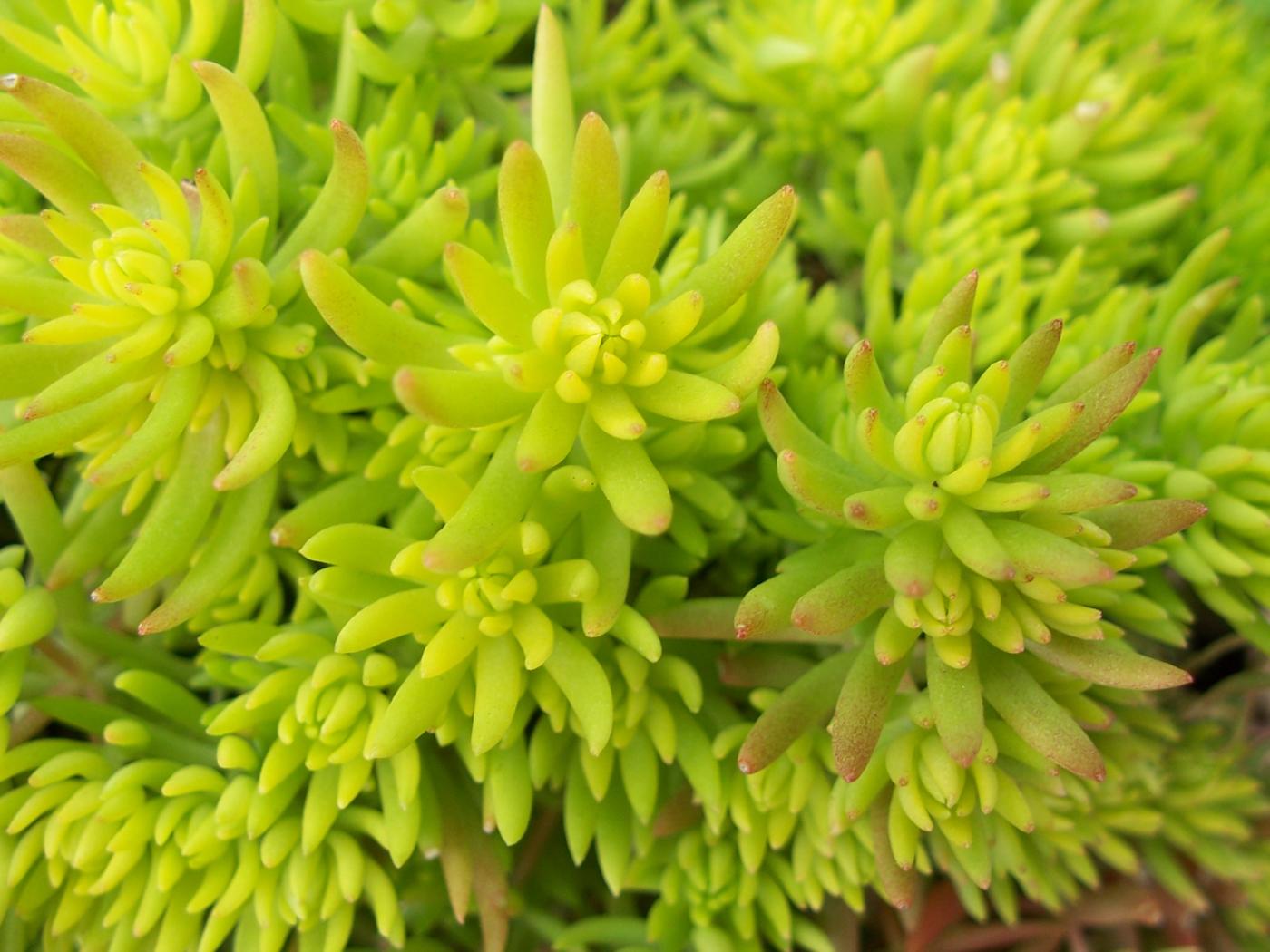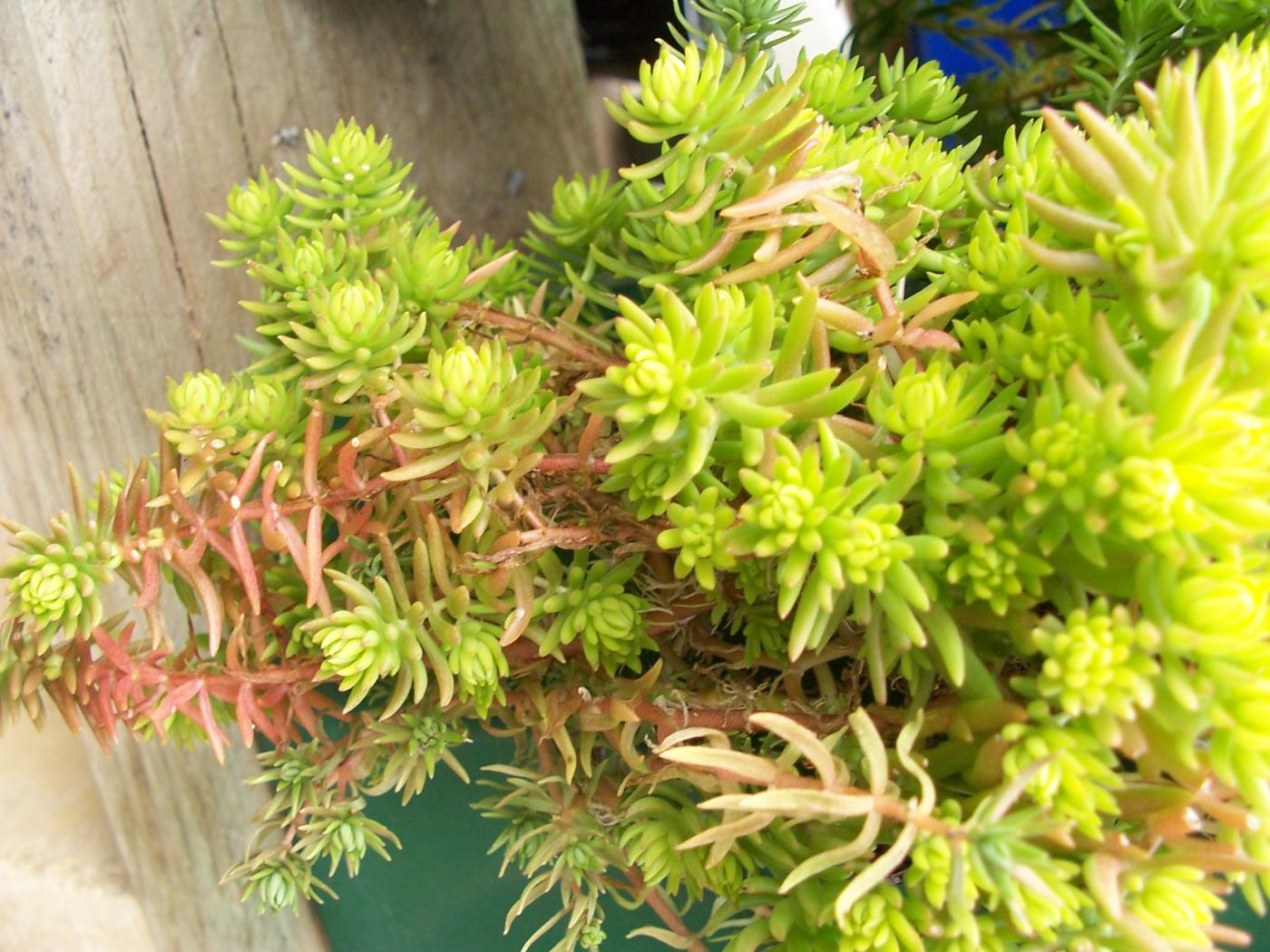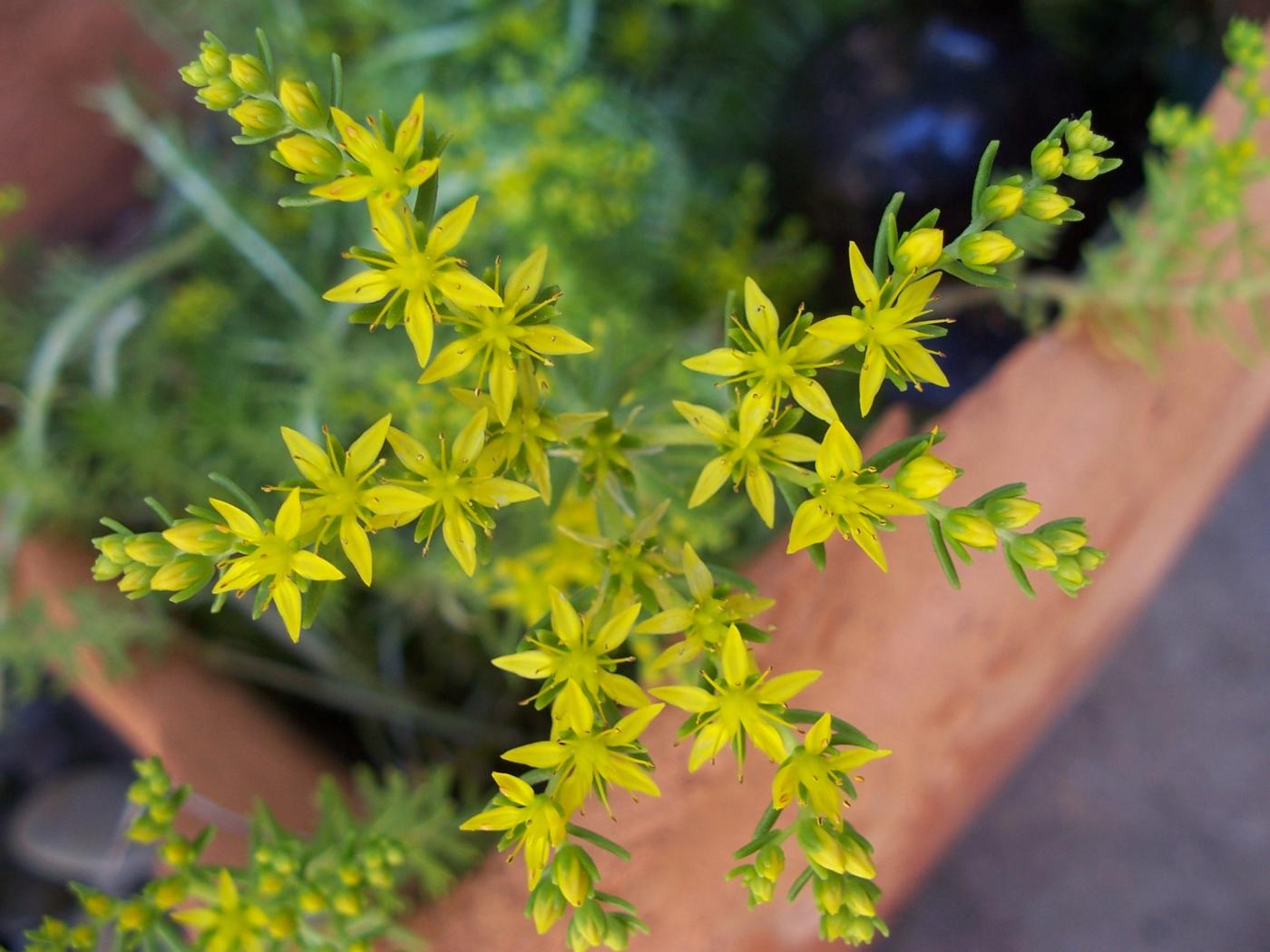You are not logged in.
- Topics: Active | Unanswered
Pages: 1
#1 2013-10-22 23:36:25
- Kaelkitty
- Member
- From: Adelaide, Australia
- Registered: 2010-12-16
- Posts: 10
Golden Sedums
This question has been giving me a headache for some time. In the USA, and elsewhere, you often come across a plant labelled Sedum rupestre 'Angelina' Here in Oz, we see a lot of plants labelled Sedum mexicanum 'Gold Mound' I've never seen these plants side by side, but they do look very similar to each other in the photos I have seen. I'm not really even sure that either of these names are correct, given the cavalier way the nursery trade seems to treat plant names! I have no ax to grind in regard to the name - I am not even sure if they could all be the same plant or not. If they are not I am not sure how to tell them apart, Anyway I've got something in my collection which I am sure is one or the other and I'd like to know what it is that I have.
Ciao, KK
PS - I DO know that S. rupestre is now Petrosedum rupestre, but I have put the names that are most commonly seen online.
Leaves and stems early in the growing season
New Growth Appearing on older stems - note the dark colour of older leaves
Flowers - when they appear the rest of the plant gets greener until the inflorescences dry up.
Offline
#2 2013-10-22 23:40:05
- Kaelkitty
- Member
- From: Adelaide, Australia
- Registered: 2010-12-16
- Posts: 10
Re: Golden Sedums
I've just realized the photo 2 is lying on it side - the plant is cascading down the side of the dark green pot standing on the wooden shelf. You'll have to put your head on one side to see it correctly - sorry about that, KK.
Offline
#3 2013-10-23 05:18:24
- Tom
- Member

- Registered: 2011-09-08
- Posts: 1,722
Re: Golden Sedums
Hi,
I had S. mexicanum, many years ago : the rosette is not so dense, and the inflorescence less branching.
Your plant looks like 'Angelina'.
Offline
#4 2013-10-23 12:35:36
- Chromaphyo
- ICN
- From: Buizingen, Belgique
- Registered: 2007-09-06
- Posts: 862
- Website
Re: Golden Sedums
For me Petrosedum rupestre 'Angelina'
Offline
#5 2013-10-24 12:30:02
- margrit
- Administrator
- Registered: 2007-09-03
- Posts: 5,388
Re: Golden Sedums
I have asked Ray Stephenson, and Sedum mexicanum 'Gold Mound' is the correct name for this plant. It is not a Petrosedum.
Offline
#6 2013-10-24 16:50:21
- Tom
- Member

- Registered: 2011-09-08
- Posts: 1,722
Re: Golden Sedums
Bravo Ray !...
Does Ray specify the differences between 'Angelina' and 'Gold Mound' ?
Last edited by Tom (2013-10-24 16:52:32)
Offline
#7 2013-10-24 20:32:10
- margrit
- Administrator
- Registered: 2007-09-03
- Posts: 5,388
Re: Golden Sedums
Ray only explained that Sedum mexicanum is closely related to Sedum lineare. So this is pretty far from Petrosedum.
As far as I have seen, S. mexicanum is a frailer plant than Petrosedum rupestre 'Angelina'.
Offline
#8 2013-10-28 00:00:00
- Kaelkitty
- Member
- From: Adelaide, Australia
- Registered: 2010-12-16
- Posts: 10
Re: Golden Sedums
Thank you all. That has scratched a very irritating itch. I shall be able to fix my names once and for all. Now all I have to do is get my hands on the other one, which seems like it might be a bit tricky here in Oz. I think I have occasionally seen then "ordinary" Petrosedum rupestre here in Adelaide but Sedums and their relatives can be tricky here as they find our summers far too hot. I've noticed that Sedum mexicanum 'Gold Mound' is not in the main site's plant catalogue as yet - I have quite a lot of pictures of this plant and would be happy to offer them for the use of the website.
Offline
#9 2013-10-30 01:00:43
- margrit
- Administrator
- Registered: 2007-09-03
- Posts: 5,388
Re: Golden Sedums
Your photos are very welcome - would you mind sending them to me directly ? Many thanks in advance.
Offline
#10 2014-12-30 19:51:51
- botan
- Member
- Registered: 2014-12-30
- Posts: 10
Re: Golden Sedums
Speaking of which, I was wondering are there more golden forms of P. rupestre than 'Angelina'? I've seen 'Gold' and 'Aureum' while searching the net, but I don't know if they are separate cultivars, or synonyms of 'Angelina'
Offline
#11 2014-12-31 20:45:59
- margrit
- Administrator
- Registered: 2007-09-03
- Posts: 5,388
Re: Golden Sedums
Would you have a link to "Gold" and "Aureum" ?
Offline
#12 2015-01-01 16:26:03
- botan
- Member
- Registered: 2014-12-30
- Posts: 10
Re: Golden Sedums
I saw 'Gold' in our Botanical garden. It's very possible the name only to refer to the colour of the plant and not to an actual variety. 'Aureum' however is accepted name form the RHS and pops up in a lot of places.
https://www.flickr.com/photos/liz21uk/14389476703/
https://www.flickr.com/photos/liz21uk/13793626773/
Here I found some non commercial photos of it.
PS: And the 'Gold' one:
http://www.vitroflora.com/en/offer/pere … ming_habit
Last edited by botan (2015-01-02 18:09:53)
Offline
#13 2015-01-02 20:07:13
- margrit
- Administrator
- Registered: 2007-09-03
- Posts: 5,388
Re: Golden Sedums
Ray Stephenson's answer : Clearly 'Angelina', there is no second "golden" cultivar. Nurseries are afraid to use the name 'Angelina' in case it carries TM, and create new names .....
Offline
#14 2015-01-02 23:05:34
- botan
- Member
- Registered: 2014-12-30
- Posts: 10
Re: Golden Sedums
Nasty nurseries... bring only chaos with those tricks. What about 'Sea Gold' it must be yellowish again, but with variegated foliage. It's kind of mythical though, I've never seen a picture of it.
My whole problem with those golds is that I found a variegated chimera sport of P. rupestre 'Angelina' and trying to find if it already exist I got totally tangled with no or false information. ![]()
Thank you for your contribution, now at least I know the parent name. Weee! ![]()
Offline
#15 2015-01-03 20:09:37
- margrit
- Administrator
- Registered: 2007-09-03
- Posts: 5,388
Re: Golden Sedums
Here is the link to 'Sea Gold' :
http://www.sedumphotos.net/v/sedum-pqr/ … 1.jpg.html
"Gold" may refer to the flowers rather than to the foliage ....
Offline
#16 2015-01-03 23:31:18
- botan
- Member
- Registered: 2014-12-30
- Posts: 10
Re: Golden Sedums
I doubt that. It's written in the link "I'm afraid mine has reverted to the green form." So probably 'Sea Gold' was variegated sport of the green rupestre (whatever that means), but still remain unknown what kind of variegation it was bearing and if it was the same in appearance with mine.
Offline
#17 2015-01-04 19:49:23
- margrit
- Administrator
- Registered: 2007-09-03
- Posts: 5,388
Re: Golden Sedums
Ray Stephenson writes in his book : Sedum, cultivated stonecrops :
"Two variegated forms are commonly grown in the United States but are rarely seen elsewhere : 'Sandy's Silver Crest', a form that turns purple in strong sunlight and has particularly striking new growth of contrasting yellow-white, and 'Sea Gold', a truly variegated slow-growing cultivar" (p. 123).
What do you mean by "what kind of variegation" ?
Offline
#18 2015-01-04 21:59:10
- botan
- Member
- Registered: 2014-12-30
- Posts: 10
Re: Golden Sedums
There are different types of variegation. 'Sandy's Silver Crest' has beautiful crown variegation. Some plants have stripe variegation, others like mine have chimeric variegation, some variegation may look chimeric but to propagate true to type vegetatively without meristem tissue, and so on.
By the slow-growing thing I assume he meant chimeric variegation, because there is a very little chlorophyll in it (and in this particular case)
We cleared the parents (almost), we cleared the variegation, now only left to compare the appearance of both plants before I can consider mine as a new cultivar. As soon as possible I will post picture of mine, but we need a picture of Sea Gold too. ![]()
Last edited by botan (2015-01-04 22:00:27)
Offline
Pages: 1